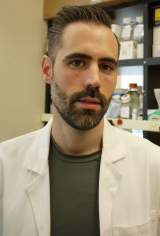Molecular Basis of ALK Inhibition Resistance in High-risk Neuroblastoma

Background
Neuroblastoma is an embryonal tumor responsible for 15% of pediatric cancer deaths. Survival rate for high-risk neuroblastoma, which affects the majority of patients, is still dismal despite the use of aggressive therapy. Relapse occurs in over half of patients, with no current prospect for a cure. Therefore, understanding the cause of relapse is critical for enabling the development of effective treatments.
In preliminary studies we observed that neuroblastoma cells expressing a mutated form of the protein Anaplastic Lymphoma Kinase (ALK), which contributes to their growth and survival, are able to survive when exposed to high doses of an ALK inhibitor, by undergoing changes in the expression of a variety of genes while exhibiting increased sensitivity to an inhibitor of BRD4, a known regulator of gene expression.
Project Goal
The objective of this proposal is to devise new treatments that prevent or eradicate relapse in high-risk neuroblastoma patients.
We hypothesize that resistance to ALK inhibition leads to enhanced BRD4 dependence. We will confirm this theory by validating BRD4's contribution to the resistant state, and identifying its partners that drive the cancer cells' survival in the absence of ALK. These results should expand our understanding of acquired resistance to treatment in neuroblastoma, and ultimately enable the eradication of these resistant cells by targeting the specific molecules required for their maintenance. Hence, this proposal has the potential to support the design of novel therapeutic strategies for high-risk neuroblastoma.
"The major objective of my project is to devise new treatments that prevent or eradicate relapse in high-risk neuroblastoma patients. Neuroblastoma is a tumor responsible for 15% of pediatric cancer deaths, and even after aggressive treatment, relapse occurs in over half of high-risk patients, with no current prospect for a cure. Understanding the cause of relapse is critical for enabling the development of more effective therapies. My proposal, with the support of Alex's Lemonade Stand Foundation, has the potential to empower the design of novel therapeutic strategies for children suffering from high-risk neuroblastoma. I am proud and honored to have been funded." - David Debruyne, PhD

